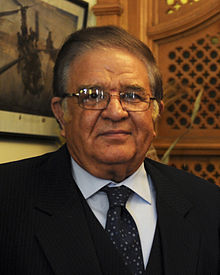Our website is made possible by displaying online advertisements to our visitors.
Please consider supporting us by disabling your ad blocker.
Abdul Rahim Wardak
Abdul Rahim Wardak عبدالرحیم وردک | |
|---|---|
 | |
| Minister of Defence | |
| In office 23 December 2004 – 7 August 2012 | |
| President | Hamid Karzai |
| Preceded by | Mohammed Fahim |
| Succeeded by | Bismillah Khan Mohammadi |
| Personal details | |
| Born | 1945 (age 79–80) Maidan Wardak, Kingdom of Afghanistan |
| Political party | National Islamic Front of Afghanistan (formerly) |
| Alma mater | National Military Academy of Afghanistan |
| Occupation | Politician, former Mujahideen leader |
General Abdul Rahim Wardak (/ˈɑːbˈdɑːl rɔːˈhiːm wɑːˈdɑːk/ ⓘ; Pashto/Dari: عبدالرحیم وردک; born 1945) is an Afghan politician and former Defense Minister of Afghanistan. He was appointed on December 23, 2004, by Afghan President Hamid Karzai.[1] Before this appointment, Wardak was the deputy Defense Minister to the former minister, Mohammed Fahim. During the 1980s Soviet–Afghan War, Wardak had been a national Mujahideen resistance leader who fought the Soviet forces. He is an ethnic Pashtun from the Wardak province. His diplomacy has been instrumental in promoting ethnic reconciliation due to his lineage from tribal chieftains with strong Pashtun relationships with all ethnic groups of the country. He is fluent in Pashto, Dari (Persian), and English.
General Wardak has testified in front of the U.S. Congress, on how to stabilize the Afghanistan-Pakistan region. He met with Richard Holbrooke in 2009, the U.S. special envoy to Afghanistan and Pakistan,[2] to discuss security with NATO's defense ministers[3] and NATO's supreme allied commander for Europe, U.S. General John Craddock.[4] In 2009, General Wardak spoke at a Washington think tank, Center for a New American Security, where he said "changing course, adopting a new strategy of containment or dropping the idea of a strong central government will be falling into the trap the enemy has laid, helping them to achieve their evil objectives."[5] He signed an accord with NATO commanders for better cooperation and coordination in counter-terrorism operations.[6] August 2012, Wardak resigned after receiving vote of no confidence from the Afghan Parliament.[7][8] He was also a candidate of the 2014 presidential election.
- ^ Hamid Karzai announces his new cabinet (.pdf) Archived September 21, 2007, at the Wayback Machine, Afghanistan: Monthly Review, December 2004
- ^ "Afghan story". Retrieved 2020-10-28.
- ^ RTT News, Feb 18, 2009 "NATO defense ministers to discuss operations in Afghanistan and Kosovo". Archived from the original on 2011-07-21. Retrieved 2009-02-21.
- ^ BBC News Feb 4, 2009 http://news.bbc.co.uk/2/hi/south_asia/7869521.stm
- ^ "Afghanistan's defense minister warns against U.S. pullback". Los Angeles Times. 27 February 2009. Retrieved 28 April 2016.
- ^ The Washington Independent Feb 12, 2009 "The Washington Independent » an Afghan Face on Everything". Archived from the original on 2009-03-08. Retrieved 2009-02-21.
- ^ "Afghan Defense Minister Announces Resignation". The New York Times. 8 August 2012. Retrieved 28 April 2016.
- ^ "Afghan Defense Minister Quits, Hands Karzai a Security Headache"
Previous Page Next Page


